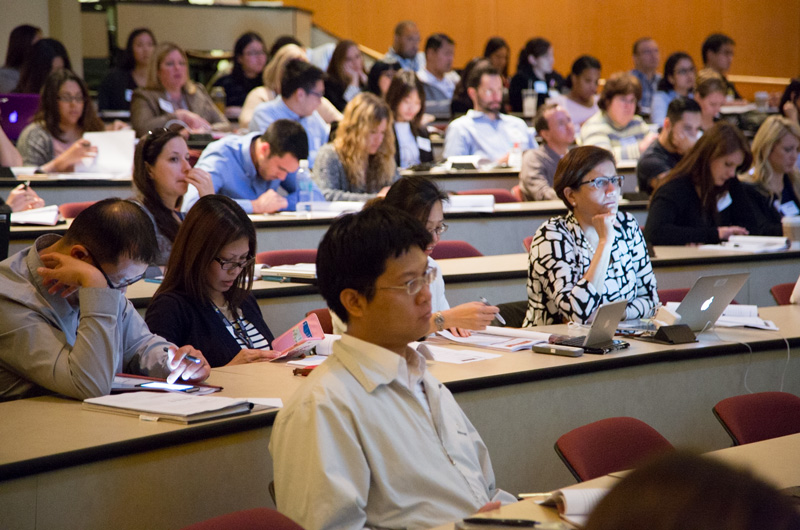SC CTSI Symposium Illuminates Complex World of Regulatory Science for Clinical Researchers
A day-long boot camp helps investigators understand the key steps and issues – as well as the potential benefits – in the fast-changing regulatory environment of clinical trial start-ups.
Nearly 150 members of Southern California's health research community packed an auditorium at the USC Health Sciences Campus for what might seem an unlikely draw: a day-long seminar on regulatory science in clinical trials.
Why the intense interest?
Investigators conducting clinical trials of new drugs and devices are increasingly aware that the regulatory aspects of research are not only legal and moral requirements, but scientific and professional necessities. In short, no new medicines or devices are likely to survive the testing and approval process unless their researchers master the details of Food and Drug Administration (FDA), state and institutional regulations.
"Clinical trials are now so highly regulated and complex that understanding the constantly evolving regulatory landscape and sharing best practices are central to the success of the research and, more importantly, to protecting the rights and safety of study participants," said Eunjoo Pacifici, PharmD, PhD, Associate Director of Graduate Programs and Assistant Professor of Clinical Pharmacy at the International Center for Regulatory Science, based at the USC School of Pharmacy.
Pacifici led the boot camp, “Clinical Trial Start-Up: What are the key steps and issues?” co-sponsored by the USC International Center for Regulatory Science, the Southern California Clinical and Translational Science Institute (SC CTSI), and the Greater Los Angeles CTSA Consortium. Pacifici and the SC CTSI developed the seminar as part of a series of training opportunities for regional research professionals to help accelerate and improve clinical trials.
The makeup of the latest seminar audience was unusually diverse, said Pacifici, including clinical research coordinators, investigators and administrators from academic centers, as well as professionals from the biopharmaceutical industry. Most attendees came from the USC and CHLA community and the greater Los Angeles area, including UCLA. But others traveled from as far as San Diego and San Francisco, from medical centers like UCI, UCSF and Huntington Memorial.

Nearly 150 attendees joined the SC CTSI Regulatory Science Bootcamp
"The large attendance really points to both the large size of the clinical trial community in California and the need for these types of educational forums," said Pacifici.
Speakers from several departments and schools discussed the main elements involved in starting a clinical trial and how best to navigate and manage them, including new opportunities and sources of support available to the research team. Topics included:
- Challenges in conducting investigator-initiated studies
- Starting off right in clinical trial startup;
- Legal concerns and principles in clinical trial agreements, including contracts;
- Managing logistics and study set-up, including storage of drugs, specimens and research charts;
- Recruiting and screening subjects, including use of marketing, social media and electronic health records;
- More on role and use of digital and social media throughout the clinical trial process, including Twitter, Facebook, search engine marketing and mobile-friendly study web pages;
- Institutional Review Boards and the role of the investigator in human subjects research; and
- Informed consent and safety of research subjects, including cultural considerations, and issues involving pregnant, traumatized, comatose, student and other participant populations.
Knowledge and Networking
Attendees said the boot camp provided a valuable opportunity to learn about opportunities and potential regulatory pitfalls in the use of new technologies, such as social media and electronic health records that play an increasingly important role in research.
"I'm very excited to use social media in the research process to engage patients," said Amy DeBlaise Kasai, BA, CCRP, a Clinical Research Manager in Pediatric Pulmonology & CF Care Center at CHLA. "We're engaging patients in accessing their own health medical records and this is another platform to engage patients."
Attendee Darren Thompson, a director at the San Diego office of management consulting firm Scimitar Inc., which works with bio-pharma client companies that develop and commercialize drugs, said the boot camp provided the kind of overview he needed to help his clients progress efficiently through trials. "It gives me the opportunity to lift the hood and get a better understanding of what drives the timeline in clinical trials, what makes it easier and what makes it harder for them," he said.
Marlene Berro, a specialist in ethics and compliance at UC San Francisco, came to the workshop to broaden her understanding of regulatory issues beyond her area of expertise. "I work a lot with study coordinators on the FDA end, but it's good to understand some of the other challenges that they have," she said. Like other attendees, Berro said face-to-face networking with colleagues and the chance to share knowledge and best practices was a particularly valuable benefit of the seminar. For example, she was interested to learn how other regulatory professionals handled specific issues such as process mapping.
Advancing the Mission of the CTSA Consortium
It's clear that the pace of change in regulatory science will likely continue and even accelerate, said Pacifici, so regular seminars in regulatory science can be an important aid to the CTSA consortium's larger mission to improve clinical trials.
"Our mission in Regulatory Science is to train professionals involved in the development and commercialization of regulated products," said Pacifici. "So courses like this support the national CTSA consortium’s mission to improve clinical trial research and researchers – we're both working to expedite the delivery of safe and effective new treatments to those in need."
The previous boot camp, “Clinical Trial Hurdles: Where are they and what should we do?” was held in November 2015. Potential future topics include: "Monitoring, Auditing, and Preparing for FDA audits;” “Conducting Clinical Trials in Special Populations;” and “Clinical Trials and Emerging Technologies.”
The lectures are available online.



